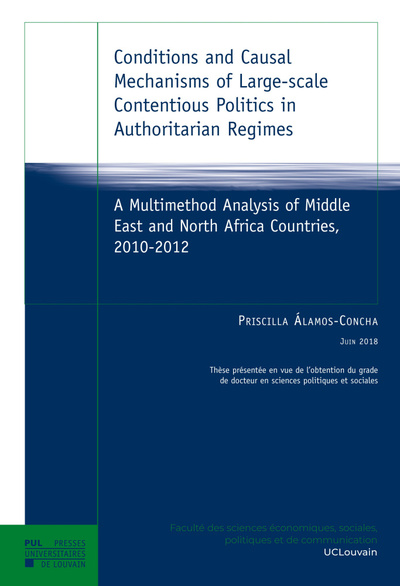
(environ
458
pages)
Conditions and Causal Mechanisms of Large-scale Contentious Politics in Authoritarian Regimes - A Multimethod Analysis of Middle East and North Africa Countries, 2010-2012
Auteur(s) Álamos-Concha (A01)
Editeur(s) PU LOUVAIN
Rayon(s) Relations internationales, SCIENCES POLITIQUES
Ean :
9782875587718
Date de parution :
13/07/2019
Résumé : Why does large-scale contentious politics successfully arise in some MENA countries while in others it does not? And what are the causal mechanisms that facilitate the success of large-scale contentious politics in the typical case of Tunisia? This research introduces the concept of 'success of large-scale contentious politics'...
Over the 2011 and 2012 period, Tunisia, Egypt, Libya and Yemen experienced the success of large-scale contentious politics, i.e. a fit between contentious politics and the displacement of incumbents. However, other authoritarian regimes in the MENA region, even if they experienced some form of contentious politics, these did not become successfully 'large-scale'. The empirical evidence leads us to a two-part puzzle: Why does large-scale contentious politics successfully arise in some MENA countries while in others it does not? And what are the causal mechanisms that facilitate the success of large-scale contentious politics in the typical case of Tunisia? This research introduces the concept of ‘success of large-scale contentious politics’ and applies a two-level model to compare 14 MENA countries by using a revisited Two-Step Fuzzy-set Qualitative Comparative Analysis. As findings, a core element is identified: the context within which the success of large-scale contentious politics takes place – a non-hereditary regime – and the conjunctural role of four conditions within this context: cohesive mobilization, military defection behavior, absence of foreign rescue and low State capacity. Further, in order to understand the process of success of large-scale contentious politics, a theory-testing processtracing technique is performed. Three interconnected causal mechanisms are conceptualized: attribution of similarity, government’s carrot and stick policies of repression and accommodation and social appropriation of mobilizing vehicles, which enable to understand the whole story about how the process of success of large-scale contentious politics takes place in Tunisia. Finally, the evidence found increases our confidence in that such causal mechanisms are present and work as theorized.
Disponible, expédié sous 2 à 6 jours
39,00 €
